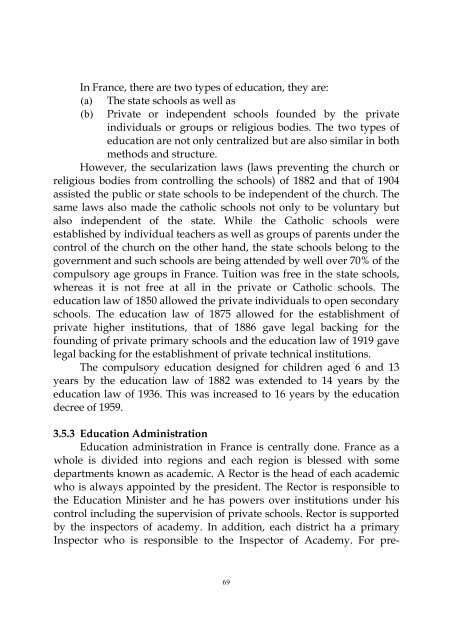edu 304 - comparative education - National Open University of Nigeria
edu 304 - comparative education - National Open University of Nigeria
edu 304 - comparative education - National Open University of Nigeria
You also want an ePaper? Increase the reach of your titles
YUMPU automatically turns print PDFs into web optimized ePapers that Google loves.
In France, there are two types <strong>of</strong> <strong>edu</strong>cation, they are:<br />
(a) The state schools as well as<br />
(b) Private or independent schools founded by the private<br />
individuals or groups or religious bodies. The two types <strong>of</strong><br />
<strong>edu</strong>cation are not only centralized but are also similar in both<br />
methods and structure.<br />
However, the secularization laws (laws preventing the church or<br />
religious bodies from controlling the schools) <strong>of</strong> 1882 and that <strong>of</strong> 1904<br />
assisted the public or state schools to be independent <strong>of</strong> the church. The<br />
same laws also made the catholic schools not only to be voluntary but<br />
also independent <strong>of</strong> the state. While the Catholic schools were<br />
established by individual teachers as well as groups <strong>of</strong> parents under the<br />
control <strong>of</strong> the church on the other hand, the state schools belong to the<br />
government and such schools are being attended by well over 70% <strong>of</strong> the<br />
compulsory age groups in France. Tuition was free in the state schools,<br />
whereas it is not free at all in the private or Catholic schools. The<br />
<strong>edu</strong>cation law <strong>of</strong> 1850 allowed the private individuals to open secondary<br />
schools. The <strong>edu</strong>cation law <strong>of</strong> 1875 allowed for the establishment <strong>of</strong><br />
private higher institutions, that <strong>of</strong> 1886 gave legal backing for the<br />
founding <strong>of</strong> private primary schools and the <strong>edu</strong>cation law <strong>of</strong> 1919 gave<br />
legal backing for the establishment <strong>of</strong> private technical institutions.<br />
The compulsory <strong>edu</strong>cation designed for children aged 6 and 13<br />
years by the <strong>edu</strong>cation law <strong>of</strong> 1882 was extended to 14 years by the<br />
<strong>edu</strong>cation law <strong>of</strong> 1936. This was increased to 16 years by the <strong>edu</strong>cation<br />
decree <strong>of</strong> 1959.<br />
3.5.3 Education Administration<br />
Education administration in France is centrally done. France as a<br />
whole is divided into regions and each region is blessed with some<br />
departments known as academic. A Rector is the head <strong>of</strong> each academic<br />
who is always appointed by the president. The Rector is responsible to<br />
the Education Minister and he has powers over institutions under his<br />
control including the supervision <strong>of</strong> private schools. Rector is supported<br />
by the inspectors <strong>of</strong> academy. In addition, each district ha a primary<br />
Inspector who is responsible to the Inspector <strong>of</strong> Academy. For pre-<br />
69
















